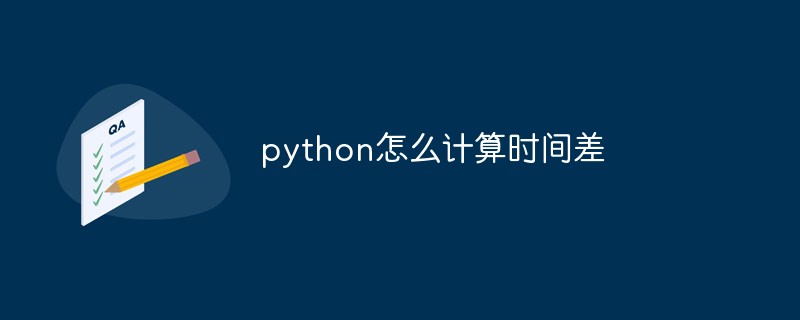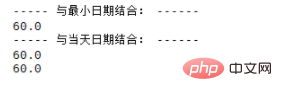How to calculate time difference in python
How python calculates the time difference: first introduce the datetime package; then use the "(time_2_struct - time_1_struct)" method to calculate the time difference on the same day or the time difference on different days.

The operating environment of this article: Windows 7 system, python version 2.7.14, DELL G3 computer.
Python to find the time difference
Python to find the time difference mainly uses the datetime package, including the time difference under the same day and the time difference under different weather conditions.
from datetime import datetime, date
1. The time difference (seconds) under the same day situation, minutes can be divided by the number of seconds by 60
#计算时间差的分钟数 # 同一天的时间差 time_1 = '2020-03-02 15:00:00' time_2 = '2020-03-02 16:00:00' time_1_struct = datetime.strptime(time_1, "%Y-%m-%d %H:%M:%S") time_2_struct = datetime.strptime(time_2, "%Y-%m-%d %H:%M:%S") seconds = (time_2_struct - time_1_struct).seconds print('同一天的秒数为:') print(seconds)

2. Different days situation The time difference below (the time difference under the same day situation can also be calculated), total_seconds
# 不同天的时间差 time_1 = '2020-03-02 15:00:00' time_2 = '2020-03-03 16:00:00' time_1_struct = datetime.strptime(time_1, "%Y-%m-%d %H:%M:%S") time_2_struct = datetime.strptime(time_2, "%Y-%m-%d %H:%M:%S") # 来获取时间差中的秒数。注意,seconds获得的秒只是时间差中的小时、分钟和秒部分,没有包含天数差,total_seconds包含天数差 # 所以total_seconds两种情况都是可以用的 total_seconds = (time_2_struct - time_1_struct).total_seconds() print('不同天的秒数为:') print(int(total_seconds)) min_sub = total_seconds / 60 print('不同天的分钟数为:') print(int(min_sub))

[Recommended learning: python video tutorial】
3. When there is only time without date, to find the time difference, you can first add the same date, and then find the time difference, datetime.combine method
# 只有时间time没有日期时,求时间差先可以加上一个相同的日期,再求时间差 # date.min能表示的最小日期 # date.max能表示的最大日期 # date.today()返回一个当前日期对象 # datetime.combine:根据所给的date和time创建一个datetime对象 time_sub = datetime.combine(date.min, time_2_struct.time()) - datetime.combine(date.min, time_1_struct.time()) print('----- 与最小日期结合: ------') print(time_sub.seconds/60) time_sub = datetime.combine(date.today(), time_2_struct.time()) - datetime.combine(date.today(), time_1_struct.time()) print('----- 与当天日期结合: ------') print(time_sub.seconds/60) print(time_sub.total_seconds()/60)

##
The above is the detailed content of How to calculate time difference in python. For more information, please follow other related articles on the PHP Chinese website!

Hot AI Tools

Undresser.AI Undress
AI-powered app for creating realistic nude photos

AI Clothes Remover
Online AI tool for removing clothes from photos.

Undress AI Tool
Undress images for free

Clothoff.io
AI clothes remover

AI Hentai Generator
Generate AI Hentai for free.

Hot Article

Hot Tools

Notepad++7.3.1
Easy-to-use and free code editor

SublimeText3 Chinese version
Chinese version, very easy to use

Zend Studio 13.0.1
Powerful PHP integrated development environment

Dreamweaver CS6
Visual web development tools

SublimeText3 Mac version
God-level code editing software (SublimeText3)

Hot Topics
 What should I do if the '__builtin__' module is not found when loading the Pickle file in Python 3.6?
Apr 02, 2025 am 07:12 AM
What should I do if the '__builtin__' module is not found when loading the Pickle file in Python 3.6?
Apr 02, 2025 am 07:12 AM
Error loading Pickle file in Python 3.6 environment: ModuleNotFoundError:Nomodulenamed...
 Is Debian Strings compatible with multiple browsers
Apr 02, 2025 am 08:30 AM
Is Debian Strings compatible with multiple browsers
Apr 02, 2025 am 08:30 AM
"DebianStrings" is not a standard term, and its specific meaning is still unclear. This article cannot directly comment on its browser compatibility. However, if "DebianStrings" refers to a web application running on a Debian system, its browser compatibility depends on the technical architecture of the application itself. Most modern web applications are committed to cross-browser compatibility. This relies on following web standards and using well-compatible front-end technologies (such as HTML, CSS, JavaScript) and back-end technologies (such as PHP, Python, Node.js, etc.). To ensure that the application is compatible with multiple browsers, developers often need to conduct cross-browser testing and use responsiveness
 Is the conversion speed fast when converting XML to PDF on mobile phone?
Apr 02, 2025 pm 10:09 PM
Is the conversion speed fast when converting XML to PDF on mobile phone?
Apr 02, 2025 pm 10:09 PM
The speed of mobile XML to PDF depends on the following factors: the complexity of XML structure. Mobile hardware configuration conversion method (library, algorithm) code quality optimization methods (select efficient libraries, optimize algorithms, cache data, and utilize multi-threading). Overall, there is no absolute answer and it needs to be optimized according to the specific situation.
 Does XML modification require programming?
Apr 02, 2025 pm 06:51 PM
Does XML modification require programming?
Apr 02, 2025 pm 06:51 PM
Modifying XML content requires programming, because it requires accurate finding of the target nodes to add, delete, modify and check. The programming language has corresponding libraries to process XML and provides APIs to perform safe, efficient and controllable operations like operating databases.
 Is there any mobile app that can convert XML into PDF?
Apr 02, 2025 pm 08:54 PM
Is there any mobile app that can convert XML into PDF?
Apr 02, 2025 pm 08:54 PM
An application that converts XML directly to PDF cannot be found because they are two fundamentally different formats. XML is used to store data, while PDF is used to display documents. To complete the transformation, you can use programming languages and libraries such as Python and ReportLab to parse XML data and generate PDF documents.
 How to modify comment content in XML
Apr 02, 2025 pm 06:15 PM
How to modify comment content in XML
Apr 02, 2025 pm 06:15 PM
For small XML files, you can directly replace the annotation content with a text editor; for large files, it is recommended to use the XML parser to modify it to ensure efficiency and accuracy. Be careful when deleting XML comments, keeping comments usually helps code understanding and maintenance. Advanced tips provide Python sample code to modify comments using XML parser, but the specific implementation needs to be adjusted according to the XML library used. Pay attention to encoding issues when modifying XML files. It is recommended to use UTF-8 encoding and specify the encoding format.
 What is the process of converting XML into images?
Apr 02, 2025 pm 08:24 PM
What is the process of converting XML into images?
Apr 02, 2025 pm 08:24 PM
To convert XML images, you need to determine the XML data structure first, then select a suitable graphical library (such as Python's matplotlib) and method, select a visualization strategy based on the data structure, consider the data volume and image format, perform batch processing or use efficient libraries, and finally save it as PNG, JPEG, or SVG according to the needs.
 How to open xml format
Apr 02, 2025 pm 09:00 PM
How to open xml format
Apr 02, 2025 pm 09:00 PM
Use most text editors to open XML files; if you need a more intuitive tree display, you can use an XML editor, such as Oxygen XML Editor or XMLSpy; if you process XML data in a program, you need to use a programming language (such as Python) and XML libraries (such as xml.etree.ElementTree) to parse.






